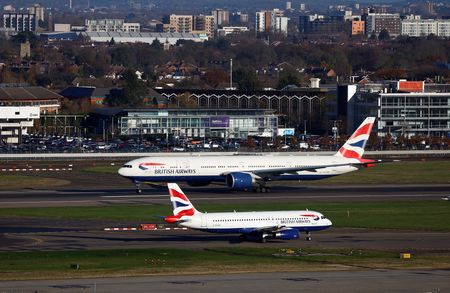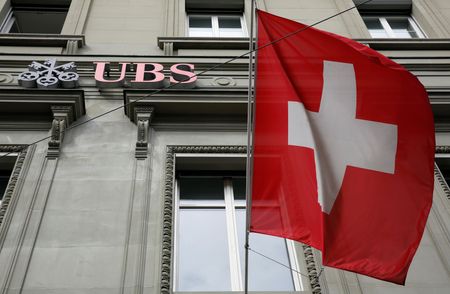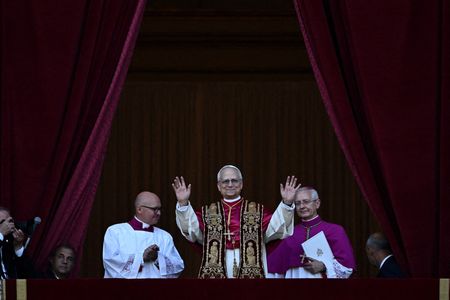By Dmitry Antonov
MOSCOW (Reuters) – Chinese President Xi Jinping told Russia’s Vladimir Putin on Thursday their two countries should be “friends of steel”, as they pledged to raise cooperation to a new level and “decisively” counter the influence of the United States.
At talks in the Kremlin, the two leaders cast themselves as defenders of a new world order no longer dominated by the U.S.
In a lengthy joint statement, they said they would deepen relations in all areas, including military ties, and “strengthen coordination in order to decisively counter Washington’s course of ‘dual containment’ of Russia and China”.
The two countries said the Ukraine conflict could only be settled by removing its “root causes” – a phrase that Russia has frequently used when arguing that it was forced to go to war to prevent the prospect of Ukraine joining NATO. Ukraine and its Western allies say that was a false pretext for what they call an imperial-style invasion.
Xi is the most powerful of more than two dozen foreign leaders who are visiting Moscow this week to mark Thursday’s 80th anniversary of the end of World War Two – a celebration of huge significance for Putin.
Xi’s participation – and the joint statement aligning China with Russia’s view of the conflict – provide Putin with an important boost as Russia comes under pressure from the United States to end the war.
Russia says it wants to repair relations with Washington, which sank to post-Cold War lows because of the conflict in Ukraine, and that it sees the potential for lucrative business deals. But talks have failed to produce a ceasefire and President Donald Trump has threatened to walk away unless there is clear progress.
Xi, whose country is currently engaged in a tariff war launched by Trump, said China and Russia should solidify the foundations of their cooperation and “eliminate external interference”.
The two countries should “be true friends of steel that have been through a hundred trials by fire”, he told Putin.
In another implied reference to the U.S., Xi said Russia and China would work together to counter “unilateralism and bullying”.
Xi and Putin have met dozens of times and signed a “no limits” strategic partnership in February 2022, less than three weeks before Putin sent his army into Ukraine. China is Russia’s biggest trading partner and has thrown Moscow an economic lifeline that has helped it navigate Western sanctions.
Putin said the two leaders would personally oversee all key elements in the relationship, aiming for a substantial boost to trade and investment by 2030.
POWERFUL GUEST
Domestically, the World War Two anniversary offers Putin a chance to rally Russians in remembrance of a historic feat that is central to the country’s national identity. The Soviet Union lost 27 million people in the war, including many millions in Ukraine, which was also devastated.
In opening remarks after greeting Xi in one of the Kremlin’s most opulent halls, Putin thanked him for coming to Moscow to mark 80 years since the “sacred” victory over Adolf Hitler.
“The victory over fascism, achieved at the cost of enormous sacrifices, is of lasting significance,” Putin said.
“Together with our Chinese friends, we firmly stand guard over historical truth, protect the memory of the events of the war years, and counteract modern manifestations of neo-Nazism and militarism.”
Putin has portrayed his war in Ukraine as a struggle against modern-day Nazis from the start. Ukraine and its allies reject that characterisation as a grotesque falsehood.
In their joint statement, the two countries said some countries were seeking to “revise the results” of World War Two. They described themselves as the “main victorious states” in that conflict, failing to mention the role of the United States, Britain and many other countries.
CEASEFIRE PRESSURE
Putin last week announced a unilateral three-day ceasefire in the war with Ukraine, beginning on Thursday. Ukraine has not committed to abide by it, calling it a ruse by Putin to create the impression he wants to end the war. Instead, it has declared its willingness to join a ceasefire lasting at least 30 days.
Ukraine targeted Moscow with drones for three days earlier this week, but the skies above the capital were calm on Thursday. With so many foreign leaders present, any attacks during the May 9 events could embarrass Putin and would likely draw a tough response from Moscow.
Ukraine’s foreign minister said Russia had repeatedly violated its own three-day ceasefire hours after it began and called the initiative a “farce”, while Moscow said Kyiv had continued fighting.
Xi has called for talks to end the conflict in Ukraine and has accused the U.S. of stoking it with weapons supplies to Kyiv. Ukrainian President Volodymyr Zelenskiy has in the past urged him to try to persuade Putin to halt the war.
(Reporting by Dmitry Antonov in Moscow, Kyiv and Beijing newsroom and Maxim Rodionov, Filipp Lebedev and Alexander Marrow in London, writing by Mark Trevelyan; Editing by Aidan Lewis and Sharon Singleton)















